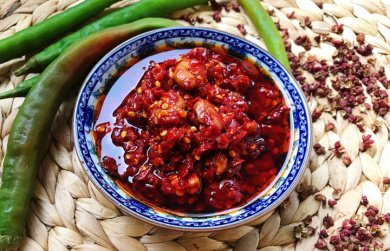Wondering what Sichuan pepper tastes like? Find out here!
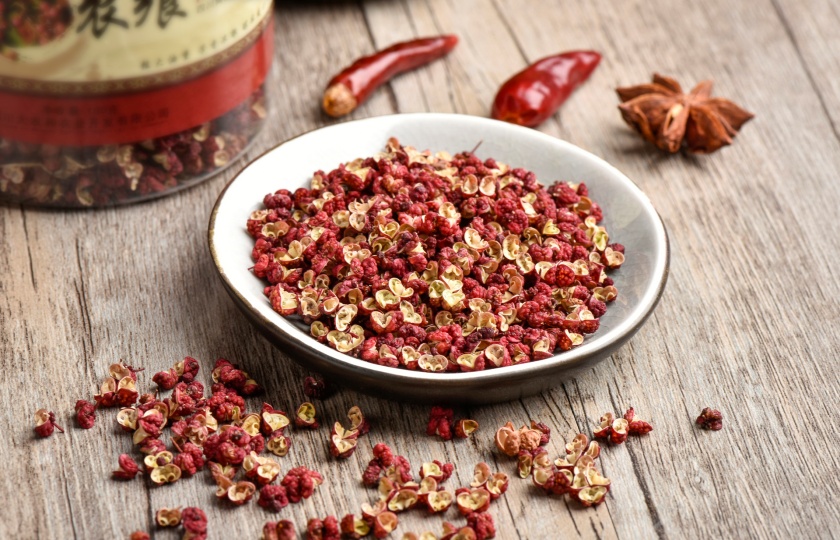
Sichuan pepper is a common spice used in Chinese cuisine, and many people are curious about its taste. Today, let's talk about what Sichuan pepper tastes like and explore its numbing and fragrant qualities!
What Does Sichuan Pepper Taste Like?
Sichuan pepper has a unique flavor that combines numbing, fragrant, and slightly bitter notes.
When you first taste Sichuan pepper, the first thing you'll notice is a strong and pure numbing sensation. This numbing is different from the sharpness other spices bring; it's layered and gradual. It feels like a gentle, playful "little massage" on your tongue. The numbing feeling starts at the tip of your tongue and slowly spreads throughout your mouth.
If you take a closer taste, you'll also notice a faint spicy fragrance. This aroma isn’t strong or overpowering, but it lingers and adds an extra layer of flavor. It blends well with the numbing sensation without taking over, enhancing the overall flavor.
Sichuan pepper's numbing sensation lasts a long time. Even after you've finished eating, you'll still feel a subtle numbing in your mouth, which keeps you coming back for more. This unique flavor is the soul of Sichuan cuisine’s "numbing, spicy, fresh, and fragrant" profile. Whether it's Mapo Tofu, Husband and Wife Lung Slices, or pepper chicken, adding Sichuan pepper can elevate the dish to a whole new level!
Is Sichuan Pepper Spicy?
Many people think that Sichuan pepper is spicy, but in fact, it is not. The "numbing" sensation and spiciness are two completely different taste experiences.
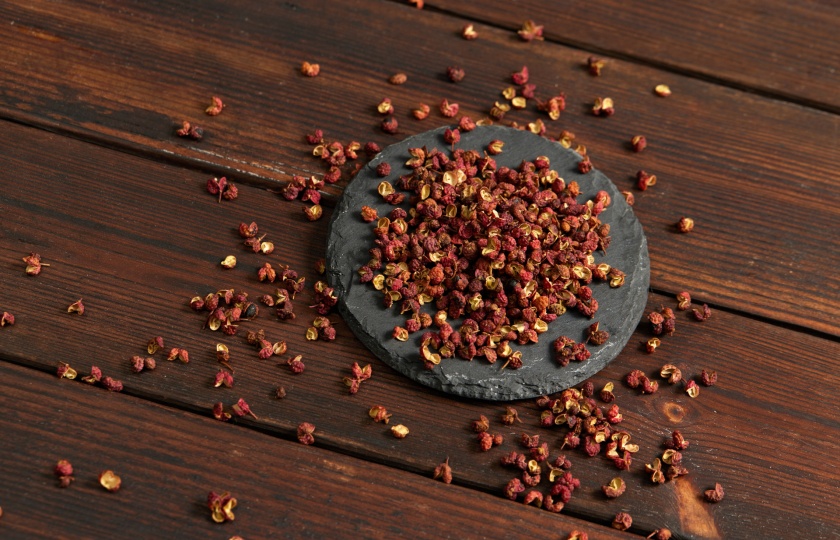
What makes Sichuan pepper unique is the numbing, slightly tingling sensation it gives to the mouth. This numbing comes from a compound called "szechuan pepperol" found in the peppercorns, not from the spicy components found in chili peppers.
So, when you eat Sichuan pepper, you won’t feel that throat-burning spice. Instead, you’ll experience a numbing, slightly cooling flavor.
However, when you pair Sichuan pepper with chili peppers, the Sichuan pepper adds complexity and layers of flavor, while the chili peppers provide the main spicy kick. Many Sichuan dishes’ numbing-spicy flavor comes from the perfect combination of Sichuan pepper and chili pepper.
The numbing sensation from Sichuan pepper can enhance the dish’s flavor, making it richer and more layered, but on its own, it is not spicy. This is the unique charm of Sichuan cuisine—while you enjoy the heat from chili peppers, you also get to experience the distinct numbing sensation from the Sichuan pepper!
What is a good Substitute for sichuan pepper?
If you don’t have Sichuan pepper on hand when cooking, you can use the following ingredients as substitutes:
Maojiao (麻椒): Maojiao has a strong numbing sensation and can be used to replace Sichuan pepper, especially in dishes that require a numbing-spicy flavor.
Tengjiao (藤椒): Tengjiao has a fresher numbing sensation than Sichuan pepper and is great for dry pot dishes or pickled pepper dishes, adding a different flavor.
Shan Nai (山奈): Shan Nai is a spice with a spicy flavor that can be used to add numbing and fragrance to dishes. It’s a good choice for braised dishes or stews.
Star Anise (八角): Star anise has a strong aroma, and though its flavor is more intense than Sichuan pepper, it can be used to add fragrance and complexity to dishes.
Black Pepper (胡椒): Black pepper has a fresh taste and works well as a replacement for Sichuan pepper, especially in dishes that need a lighter flavor.
Bamboo Leaf Pepper (竹叶椒): Bamboo leaf pepper has a stronger spiciness than Sichuan pepper, making it suitable for those who like bold flavors, but be careful with the amount you use.
How to Use Sichuan Pepper?
Sichuan pepper has a variety of uses. Here’s a detailed guide:
Making Seasonings
Sichuan Pepper Powder: Toast the Sichuan pepper on low heat until fragrant, then grind it into powder. It’s great for sprinkling on noodle dishes to enhance flavor or using as a seasoning for barbecue or cold dishes.
Sichuan Pepper Oil: Pour oil into a pan and add Sichuan pepper. Fry on low heat until the fragrance is released, then strain out the pepper. The leftover oil is fragrant Sichuan pepper oil. You can add a few drops to soups, fillings, or dishes just before finishing to instantly elevate the numbing flavor.
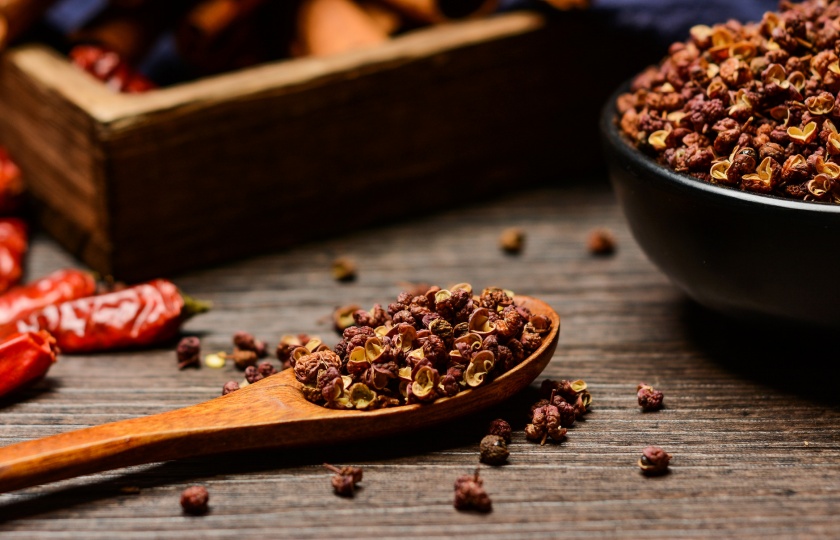
Cooking Dishes
Stir-Frying: When stir-frying vegetables or meats, toss a few Sichuan peppercorns into hot oil to release their fragrance, then continue cooking. This adds a unique aroma to your dish. For example, stir-frying potato strips, adding Sichuan pepper first will enhance the flavor.
Stewing: When stewing meat or fish, adding some Sichuan pepper can help remove fishy smells and add fragrance. For beef stew, adding about 10 Sichuan peppercorns will help eliminate the meat’s odor and give the dish a richer flavor.
Making Soup: Adding a bit of Sichuan pepper to your soup will deepen its taste. For example, in making pig’s trotters soup, adding a few Sichuan peppercorns will enrich the flavor and reduce greasiness.
Cold Dishes: In dishes like cold cucumber or cold bamboo shoots, sprinkling Sichuan pepper powder or drizzling Sichuan pepper oil enhances the flavor and provides a numbing sensation that excites the taste buds and increases appetite.
Marinating Meat: When marinating meat, adding Sichuan pepper can help eliminate any unpleasant odors, infuse fragrance, and enhance the flavor. For example, marinating chicken wings with Sichuan pepper and other spices will make the wings fragrant and numbing.
Making Snacks
Sichuan Pepper Flatbread: Add Sichuan pepper powder to the dough when making flatbread, then bake or pan-fry it. The result is a delicious flatbread with a unique numbing flavor that becomes more fragrant as you chew.
Sichuan Pepper Twists (麻花): Incorporate Sichuan pepper powder into the dough when making twists, and the result is crispy, delicious twists with a mild numbing flavor.
Things to Keep in Mind
Don't use too much Sichuan pepper, as it can overpower the natural flavor of the ingredients.
Wash Sichuan pepper thoroughly before use to avoid any impurities that may affect the taste.
Store Sichuan pepper in a cool, dry, and ventilated place, avoiding humidity and high temperatures, to maintain its fragrance and flavor.
How Much Sichuan Pepper to Use?
The amount of Sichuan pepper you use can be adjusted according to the dish and personal taste preferences. Below are some suggestions based on the dish and the level of numbing flavor you prefer:
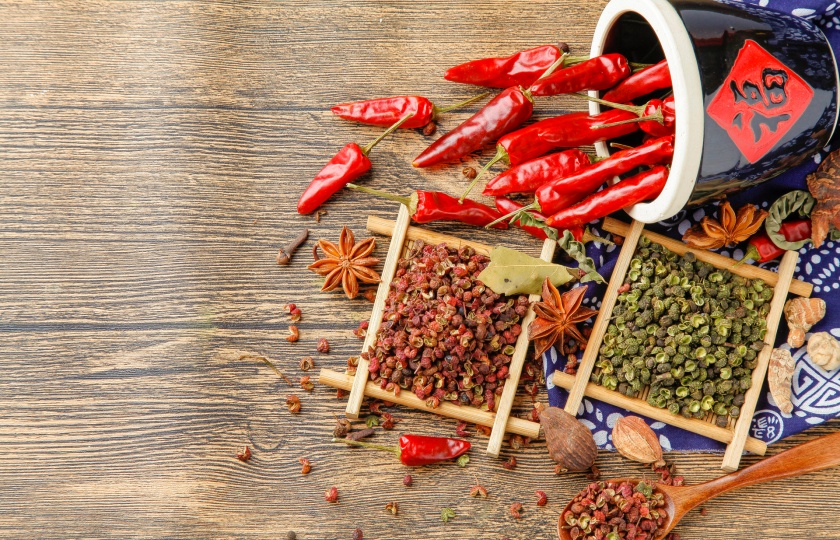
For Light Numbing Dishes:
If you're making simple cold dishes like spicy mixed vegetables, cold salads, or small hot pots, you only need a light numbing effect. Around 5-10 peppercorns should be enough, avoiding overpowering the dish’s natural flavors.
For Medium Numbing Dishes:
In dishes like mouth-watering chicken (口水鸡) or spicy hot pot (麻辣香锅), 10-20 peppercorns will give a noticeable numbing sensation without being overwhelming. This is perfect for those who enjoy the numbing flavor but don’t want it too intense.
For Heavier Numbing Dishes:
For strongly flavored dishes like spicy hot pot, spicy beef, or spicy crayfish, you can use 30 or more Sichuan peppercorns, or even more. Heavier dishes need the numbing sensation to balance the heat. The more peppercorns you use, the stronger the numbing flavor. If you prefer a milder flavor, you can reduce the amount.
Sichuan Pepper Powder:
If you’re using Sichuan pepper powder, adjust the amount according to the size of your dish. Generally, 1-2 teaspoons (5-10 grams) per dish is enough. Sichuan pepper powder has a more delicate flavor, making it ideal for sprinkling on top of dishes or adding to soups and sauces.
Things to Keep in Mind:
Sichuan Pepper’s Numbing Effect Is Strong: The numbing sensation from Sichuan pepper is gradual. It’s best not to add too much at once. Add it little by little, tasting as you go to decide if more is needed.
Toast the Pepper First: When using whole Sichuan peppercorns, it’s recommended to toast them in a pan over low heat before adding them to your dish. This helps release the numbing sensation and fragrance more effectively.
Personal Taste: The amount of Sichuan pepper can be adjusted based on how much numbing flavor you enjoy. If you love the numbing sensation, feel free to increase the amount. If you prefer a lighter taste, reduce the amount accordingly.
Where to Buy?
Asian Supermarkets: The good news is that many cities in Europe and the U.S. have Asian supermarkets, and these stores typically sell a variety of Chinese seasonings, including Sichuan peppercorns.
For example, in the U.S. and the U.K., you can almost always find Sichuan peppercorns in large Asian supermarkets, and they come in many varieties, including dried peppercorns, peppercorn powder, and pepper oil.
Chinatowns: Most European and North American cities have a Chinatown, where you'll find a wide range of imported Chinese ingredients and seasonings.
You can easily find Sichuan peppercorns in these areas, and they are often reasonably priced. If you're not familiar with the area, you can ask local Chinese-speaking people for recommendations—they’ll give you great advice.
Online Shopping Platforms: If there’s no Asian supermarket nearby, or if you prefer shopping from home, online shopping platforms are a good option.
For example, in the U.S., Amazon has a variety of Sichuan peppercorns, including dried peppercorns, peppercorn powder, and pepper oil. In the U.K., you can also buy them from specialized Asian food websites.
Large Supermarkets: Some large supermarkets in Europe and the U.S., such as Costco in the U.S. or Tesco in the U.K., carry a small selection of Chinese seasonings, including Sichuan peppercorns. While the variety may not be as extensive as in Asian supermarkets, it should suffice for basic needs.
Chinese Restaurants or Food Importers: If you know a Chinese restaurant owner or a food importer, you can purchase Sichuan peppercorns directly from them.
They often import high-quality Sichuan peppercorns from China, ensuring good quality and saving you some trouble.
How to Store?
Sichuan peppercorns are relatively easy to store because they are usually dried. You can store them by placing them in a sealed bag, removing the air, sealing it, and then placing them in a cool, ventilated area. This method prevents the peppercorns from coming into contact with air, slowing down the oxidation process and preserving their bright color. Sealing also helps avoid moisture exposure, which can extend their shelf life.
If you live in a humid area, consider storing them in the refrigerator. Place the peppercorns in a sealed container and refrigerate them. This will help preserve the aroma and freshness, extending their shelf life.
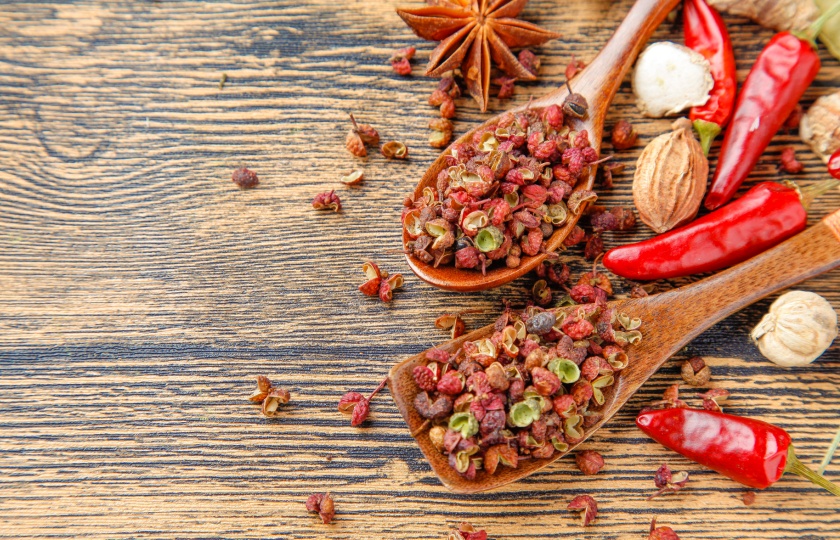
Tips for Storing:
Choose Dry Peppercorns: Before storing, make sure the Sichuan peppercorns are dry. Moist peppercorns are more prone to mold and spoilage.
Avoid Humid Environments: Keep Sichuan peppercorns away from humid places like damp corners of the kitchen or the basement, as these areas can foster mold growth, leading to spoilage.
Check Regularly: Regularly check the condition of your Sichuan peppercorns. If you notice any strange smells or signs of mold, discard them immediately. Do not use spoiled peppercorns in cooking, as they can affect the taste and your health.
Use as Needed: Only buy the amount of Sichuan peppercorns you need for cooking to avoid waste.













